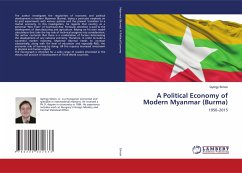The author investigates the regularities of economic and political development in modern Myanmar (Burma), laying a particular emphasis on its past experiments with various systems and the present transition to a market economy. In this investigation, he regards that country as a potential ¿New Tiger¿ of Southeast Asia. Particular attention is paid to the development of manufacturing and agriculture. Relying on his own model calculations that take the key role of technical progress into consideration, the author contends that there is a combination of factors determining the development of any national economy. Therefore, in order to build a successful market economy, Myanmar (Burma) needs to increase substantially, along with the level of education and especially R&D, the economic role of learning by doing. All this requires increased investment in physical and human capital.The monograph is intended for a wide range of readers interested in the theory and practice of development of Third World countries.
Bitte wählen Sie Ihr Anliegen aus.
Rechnungen
Retourenschein anfordern
Bestellstatus
Storno

